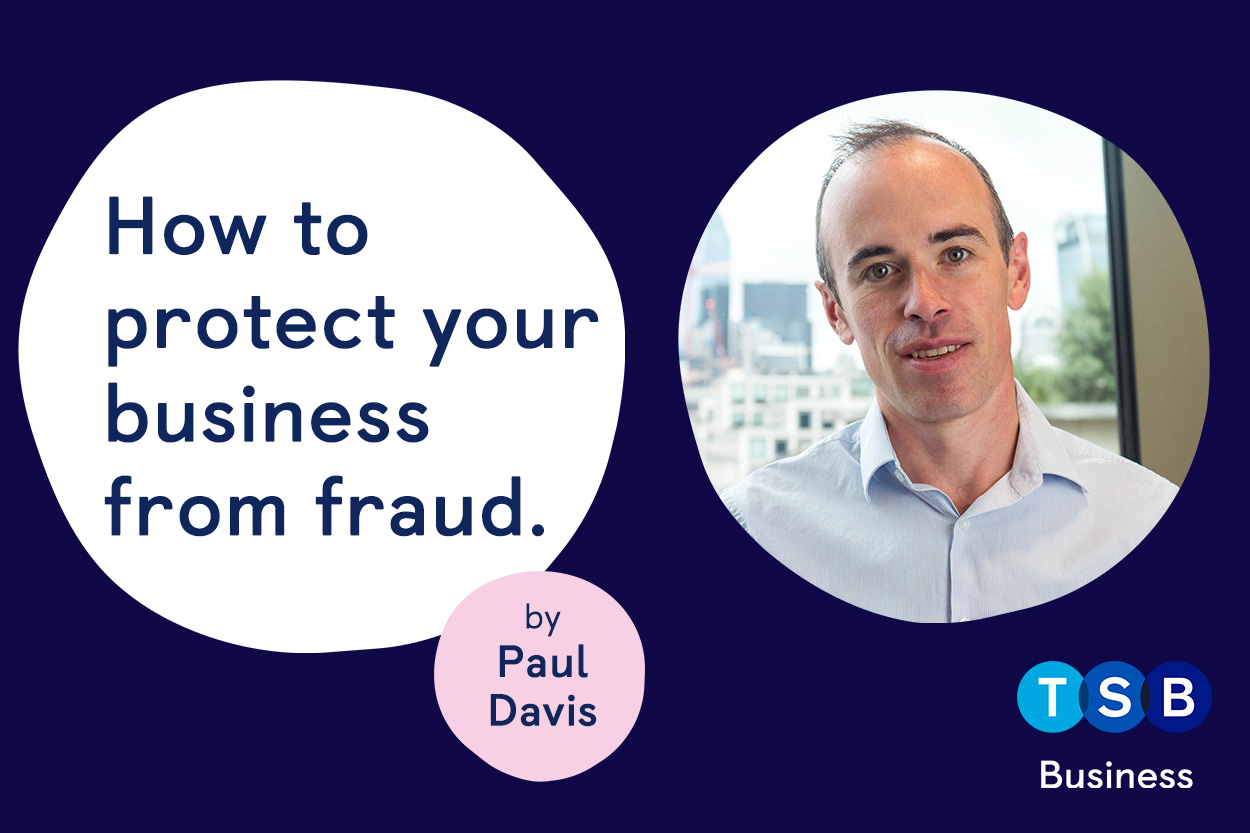Together we can end domestic abuse.
Protect your business from fraud

By Paul Davis, Director of Fraud at TSB
Small business owners have a lot to juggle. From banking and management issues to simply ensuring the cash keeps flowing, day-to-day commitments mean there’s a lot going on at any one time.
But there are big picture issues that need to be factored in too, not least the ever-growing risk of fraud. Between 2021 and 2022, cases rose by 151% in the UK, according to KPMG’s Fraud Barometer 2022, which was published earlier this year.
That’s why fraud is an issue small businesses simply cannot afford to ignore.
Just a few simple steps, some clever thinking and clear, open conversations with your team will help you get ahead of the criminals, and stay there, doing everything you can to safeguard your business for the future.
This simple guide to fraud, and how to protect your business from the risks, will get you started.
And remember, at TSB our Fraud Refund Guarantee is also available to business customers.
What types of fraud are small and medium businesses at risk of?
Criminals use a whole range of approaches to defraud small and medium businesses from unsolicited text or email requests for money and personal information, to unsolicited phone calls.
Some fraudsters even try to impersonate senior team members to get staff to make urgent payments or change existing bank account details.
Others use investment scams and online phishing attacks, with some targeting payroll and loans to access funds unlawfully. The methods are wide-ranging, meaning everyone in the team needs to be on board to combat the risk.
The unfortunate truth is that fraud can come from anywhere, including from employees, customers and suppliers, as well as those unconnected to the organisation.
So how can you protect your business?
Audit regularly
Identify the areas of your business which might be most exposed to potential fraud, and ensure these are audited regularly.
By considering your organisation’s weak spots and having plans in place to protect them, you’ll create an added ring of steel where you need it most.
Use the phone
We’re all so used to doing everything digitally these days it can be easy to forget to lift the phone. Yet when it comes to fraud, getting a voice on the other end of a call is a must, especially when setting up payments.
The main risk we’re seeing to SMEs at the moment is invoice fraud, coming in primarily via email. The answer here is simple – don’t rely solely on this means of communication.
Accounts can easily be hacked meaning fraudsters can set up new domains that look like genuine senders with very little effort so before confirming any new payments, make sure someone on your team has verified bank details over the phone with a trusted person.
Keep financial control procedures up to date
Sadly, internal fraud is a real risk to businesses across the UK and tends to increase during difficult times like the current cost of living crisis.
So make sure your business is on the ball by keeping financial control procedures up to date and ensuring they’re being followed closely by everyone in the team.
For example, write down procedures around how bills are paid, and conduct regular inventories of all products and materials owned by the business. Share financial duties between several employees.
Identify and monitor assets
Before you can protect your assets, you need to know what they are so make and regularly update a detailed list.
Put in place processes to monitor their status regularly and ensure the team stay on top of this with structured updates and reviews.
Check who has access to the accounts
Who are the signatories to your business’s bank accounts? Keep on top of this and make sure everyone with access is aware of what’s expected of them when dealing with the business’s money.
Look back over team members who previously had access to the accounts and if you no longer need them on it, make sure they are removed from the approved group of signatories.
Train your team to be fraud savvy
Cyber criminals work on an industrial scale to gain access to businesses, using a huge range of sophisticated tools to make it happen.
One of the simplest approaches is the malicious email, inviting users to open attachments which can look harmless but lead to a business-crippling cyber-attack.
Key to prevention here is staff training. A whole range of online courses are available or consider inviting an expert into your workplace to make sure the team is fully clued up on what to look out for and how to properly report a rogue email when they spot one.
Send test emails to see if your team can spot phishing attempts and know not to click on rogue emails.
By establishing a culture of fraud awareness in your organisation, you’ll create a powerful layer of protection.
Get strong digital defences in place
As well as training your team, invest in robust email filtering controls.
A while range of fraud management software options are available, so seek expert advice and find one to protect your SME’s IT systems from what could potentially be a damaging online attack. Intelligent software will be your first line of defence.
Check third-party controls
With many SMEs outsourcing their banking affairs to third parties like accountants, it’s worth checking how rigorous their fraud controls are.
It’s your money they’re dealing with, so make sure you’re confident they’re guarding it as closely as you would.
TSB’s Fraud Refund Guarantee is also available for business customers. Find out more here and ensure your business has the protection it needs. And check out TSB’s Fraud Prevention Centre for more tips on how to protect yourself.
For more information on ways TSB can help you and your small business, click here.
